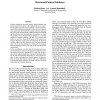Free Online Productivity Tools
i2Speak
i2Symbol
i2OCR
iTex2Img
iWeb2Print
iWeb2Shot
i2Type
iPdf2Split
iPdf2Merge
i2Bopomofo
i2Arabic
i2Style
i2Image
i2PDF
iLatex2Rtf
Sci2ools
AIPS
2009
2009
Structural-Pattern Databases
abstraction heuristics, notably pattern-database and merge-and-shrink heuristics, are employed by some state-ofthe-art optimal heuristic-search planners. The major limitation of these abstraction heuristics is that the size of the abstract space has to be bounded by a (large) constant. Targeting this issue, Katz and Domshlak (2008b) introduced structural, articular fork-decomposition, abstractions, in which ning task is abstracted by an instance of a tractable fragment of optimal planning. At first view, however, the lunch was not free. Some of the power of the explicit abstraction heuristics comes from pre-computing the heuristic function offline, and then determine h(s) for each evaluated state s by a very fast lookup in a "database". In contrast, fork-decomposition offer a poly-time, yet far from being fast, computation. In this contribution, we show that the time-per-node complexity bottleneck of the fork-decomposition heuristics can be successfully overcome. Specificall...
Abstraction Heuristics | AIPS 2009 | Artificial Intelligence | Explicit Abstraction Heuristics | Merge-and-shrink Heuristics |
Related Content
| Added | 08 Nov 2010 |
| Updated | 08 Nov 2010 |
| Type | Conference |
| Year | 2009 |
| Where | AIPS |
| Authors | Michael Katz, Carmel Domshlak |
Comments (0)

